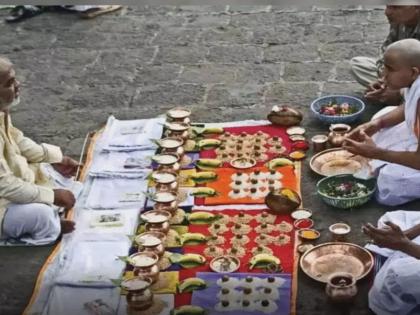Pitru Paksha 2024: Dates, Significance, Sarvapitri Amavasya and Everything You Need to Know About
By Lokmat English Desk | Updated: September 18, 2024 15:43 IST2024-09-18T15:41:22+5:302024-09-18T15:43:28+5:30
Pitru Paksha, also known as Pitr-Paksha or Sorah Shraddha, is a significant 16-lunar day period in the Hindu calendar ...

Pitru Paksha 2024: Dates, Significance, Sarvapitri Amavasya and Everything You Need to Know About
Pitru Paksha, also known as Pitr-Paksha or Sorah Shraddha, is a significant 16-lunar day period in the Hindu calendar dedicated to honoring ancestors. This observance occurs annually, starting on the Pratipada Tithi of Krishna Paksha in the month of Bhadrapada and concluding on Mahalaya Amavasya, which this year falls from September 17 to October 2, 2024.
During Pitru Paksha, Hindus perform rituals such as Shraddha and Tarpana, which involve offerings of food and water to their ancestors. These rituals are believed to ensure the peace and satisfaction of the souls of the departed, allowing them to attain moksha (liberation) and providing blessings to their descendants in return. The period is considered inauspicious for initiating new ventures or celebrations, as it focuses on remembrance and respect for the ancestors.
Pitru Paksha has its roots in Hindu mythology, specifically linked to the story of Karna, a renowned warrior from the Mahabharata. According to legend, Karna was cursed for failing to perform Shraddha for his ancestors. To seek redemption, he was granted a 15-day period on Earth to offer food and conduct rituals for his forebears, which has since evolved into the observance of Pitru Paksha.
During this period, families typically engage in various rituals:
Daily Offerings: Each day is dedicated to honoring specific ancestors based on their death anniversaries.
Food Offerings : Special meals are prepared and offered to Brahmins or those in need as a gesture of respect and gratitude towards ancestors.
Spiritual Practices: Families may also participate in prayers and recitations from sacred texts to invoke blessings for their ancestors.
Getting rid of paternal debt doesn't have to cost a lot. Shraddha can be performed only once a year on their main day, with the most readily available water, sesame seeds, rice, kush and flowers. By doing this, the burden of paternal debt is lightened on us. For this reason, this Shraddha ritual has been going on since time immemorial. There is a verse in Smritchandrika about the results of doing Shraddha
Ayu: Putran Yash: Swarga Kirtin Pushti Balam Shriya:
Pashunam Saukhya Dhana Dhanya Prapruyata Pitrupujanat
Life, sons, success, heaven, fame, confirmation, strength, Lakshmi, animals, wealth, wealth, grain are obtained by Pitripujan, i.e. by performing Shraddha. That is, with the satisfaction of the fathers, the devotee develops. In that too, the results of Shraddha vidhi according to the date have been given in Dharma Shastra. They are as follows-
- Pratipada - Attainment of good sons, cattle etc
- Second - daughter, wealth
- Tritiya - Ashwaprapti (in today's society can be interpreted as horse race of success)
- Chaturthi - Money, Private vehicle, Wellness
- Panchami - Children's success
- Shashti - bright offspring
- Saptami - Agriculture, acquisition of land, gain
- Ashtami - Profit in business
- Ninth - Boom in job industry
- Dashami - Welness, glory
- Ekadashi - Benefit of worldly happiness
- Dwadashi - Golden gain
- Trayodashi - position, prestige
- Chaturdashi - General contented life
- Amavasya - Fulfillment of all desires
The days from the tenth lunar day (Dashami) onwards, excluding the fourteenth day (Chaturdashi), are considered the most suitable for performing Shraddha rituals. These days fall within the waning phase of the lunar month (Krishna Paksha) and are believed to be particularly beneficial. After going through the benefits associated with these days, it becomes evident that the practice of Shraddha is not merely about ensuring the spiritual well-being of one's ancestors but also about guiding the living towards a virtuous life. For those uncertain about the specific lunar day associated with their departed ancestors, it is recommended to perform the Shraddha ceremony on Sarvapitri Amavasya, the new moon day dedicated to all ancestors.
Open in app